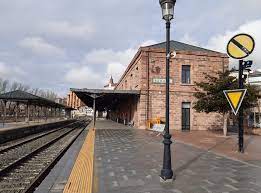Biography
Ambrose Gwinnett Bierce, was born on 24 June on 1842
in Meigs County, Ohio, United States, and died around 1914 in Chihuahua or
Ojinaga, Mexico –this is a mystery!! They don’t have evidences, because his
body was never found after his death. He married Mary Ellen Day (Molly) in 1871,
and they had three children: Helen Bierce, Day Bierce and Leigh Bierce.
All instruction he received was from his father’s books,
a farmer from Connecticut. After
graduating, he became known as a journalist in San Francisco, collaborating in
various newspapers and becoming an editor. Years later, after returning from
London, he went to live in Washington D.C.
When he was young, he enlisted to fight in the Civil War.
He was a writer of short stories, journalist and
American editor. His satirical style of sharper works, with tragic humour and
violent themes that always revolved around death, earned him the nickname of
"Bitter Bierce". His literature exerted a strong influence on the
Pacific Coast and several critics defined him as dry, functional and mechanical,
and even compared him to great poets such as Edgar Alan Poe and also with
Nathaniel Hawthorne and H.P. Lovecraft. Bierce wrote several books and stories
and was a screenwriter for some movies. Among some books, the most notable are:
The Damned Thing, The Devil’s Dictionary, Chickamauga and An
Inhabitant of Carcosa.
His legacy and influences were many, among them there are
three films made based on the short story An Occurrence at Owl Creek Bridge.
Summary
This history talks about death. The entire scene takes
place on a battlefield, where we can see the cruelty among the dead and those
who barely survive. It talks about two friends, who, raised together since
their early childhood, it is very difficult to separate from so much affection.
One of them has no military aptitude or disposition, yet he enlists in the army
to be close to his unconditional friend. However, the relationship was
maintained with difficulties and in a different way, due to their military rank
and the required distance.
The story speaks of a lot
of blood, coldness, challenges, decisions and mismatches, and, as the final
revelation demonstrates, says that, however arrogant an individual can
demonstrate, the feeling and love came to the surface at the end. In our story,
the captain, in a rush of courage, makes the strong decision of shortening the
suffering of a dying man, and leaves us with doubt and reflection: Even with
the supplication of the dying, was this the best shot? Could the help that
arrived have saved him?
QUESTIONS
In the story, they “wounded must wait until the end of the battle”. Do you think it’s a correct policy in a war? (In recent American films, the army always tries to rescue the wounded or the prisoners.)
Many of the enemy’s dead were counted several times. Why? (They say “History is always written by the winners.”)
Talk about the three characters (personality, relations with the others, rank in the army…)
Madwell
Caffal Halcrow
Creede Halcrow
What does this sentence mean “these two patriots would
doubtless have endeavoured to deprive their country of one another’s services”?
Do you know the story of David,
Bathsheba, and Uriah (2 Samuel,
11-12)? Is there any relation to our story?
Describe the situation in which sergeant Halcrow is
after the battle. Why was he in so bad condition?
Who was Prometheus and why is he mentioned in our
story?
What is exactly a coup de grâce? Describe the coup
de grâce in our story.
How did the horse die? Why do you think he killed the
horse first?
What is your opinion about the euthanasia? Are you pro or con? Why?
succor, splinter, strecher-bearer, exposure, avail, score, glean, reap, quit, bearings,
wretch, unheed, clump, daring, non-comissioned, comissioned, saturnine, repartee,
defiled, besmirch, swine, chine, choke, utterance, cock (a gun) v., muzzle, trigger,
report n.





